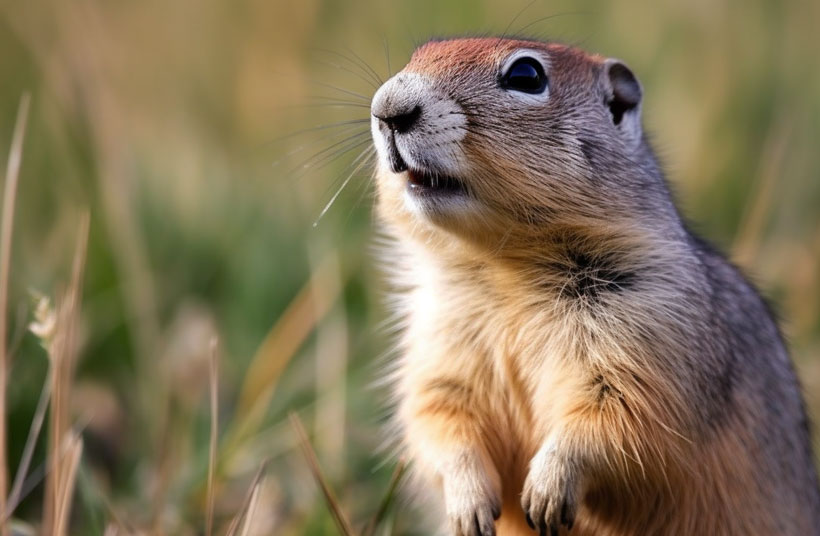Can You Have a Gopher As a Pet?
Exotic pets have become increasingly popular in recent years. One such animal that has gained attention is the gopher. Gophers are small burrowing rodents that are known for their extensive tunnel systems and ability to live in a variety of habitats.
Can you have Gopher as a pet? Gophers aren’t often considered attractive as pets. But to some individuals, it may look so due to their unique and interesting appearance. With their soft, brown fur and big, curious eyes, they have a cute and charming appearance that appeals to many animal lovers.
Gophers are also known for their territorial behavior, and will aggressively defend their burrows from other animals, including other gophers. They communicate with each other through some vocalizations and also mark their territory with scent glands located on their cheeks.
This article will go over whether gophers make good pets and what it takes to care for them. We will also understand the ethical and legal consequences of keeping them as pets. So, keep reading!
Pros and Cons of Owning a Gopher as a Pet
Knowing the pros and cons before owning gophers as a pet is essential. It will help you to decide whether or not it is an appropriate choice for you.

Pros
As mentioned before, gophers are unfit as a pet for their behavior and characteristics. Still, the following might be the pro measures:
- Fascinating Animals: Gophers are fascinating animals to observe, with their playful and curious nature. They can be entertaining pets.
- Low Maintenance Requirements: As animals that are accustomed to living independently in the wild, gophers have relatively low maintenance requirements. They do not require a lot of attention or specialized care, which might make them ideal pets.
Please be aware that these are not established facts. Gophers are not suggested as pets. Therefore these are merely educated guesses.

Cons
There are much more cons compared to pros to owning a gopher as your pet.
- Need ample space: Gophers are burrowing animals that require ample space to roam and explore. This can be challenging for pet owners who live in apartments or small homes. Creating an adequate enclosure for a gopher can also be expensive and time-consuming.
- Devasting Behavior: Gophers are known to exhibit devastating behavior, such as digging tunnels and chewing on objects. This can lead to damage to property and may require additional training and attention from the pet owner.
- Challenging to domesticate: Keeping backyard wildlife as pets, such as gophers, can be a challenging and time-consuming process. Gophers are wild animals and may exhibit fear or aggression toward humans. This can make it difficult to establish a bond with them.

Furthermore, gophers may have a hard time adjusting to captivity and may experience stress or health problems as a result.
- Legal and ethical considerations: In some areas, it may be illegal to keep gophers as pets without the appropriate permits. So, you simply just can’t expect gophers to find in pet stores. It is important to research the laws in your area before deciding to keep a gopher as a pet.
From an ethical standpoint, some animal welfare advocates argue that keeping wild animals like gophers in captivity is inherently cruel. Gophers are burrowing animals, and it may be difficult to provide them with an enclosure that fully replicates their natural habitat.
Additionally, gophers may suffer from stress or health issues due to the stress of captivity or improper care.
Hence, keeping gophers as pets raises several legal and ethical considerations. In many regions, it may be illegal to keep certain gopher species as pets or to trap and keep them without a permit. Therefore, it’s important to check with local wildlife agencies and obtain any necessary permits before keeping gophers as pets.
Gopher Habitat Requirements
Now, the question is how can you keep a Gopher as a pet? Gophers are fascinating and unique animals that require specific habitat requirements in captivity to ensure their health and well-being.

When creating a habitat for gophers in captivity, it’s important to consider their natural environment and provide an enclosure that meets their needs.
Optimizing Enclosure Size for Pet Gophers
Caring for pet gophers involves creating an appropriate enclosure size for them. As burrowing animals, gophers require ample space to dig and explore. The enclosure should be at least 6 feet long and 2 feet wide, with a minimum depth of 18 inches to allow for adequate burrowing.
Maintaining Proper Temperature for Pet Gophers
Gophers are adapted to living in a range of temperatures, but they prefer cooler temperatures between 50°-60°F.
Besides, the enclosure should be kept out of direct sunlight and away from heat sources to prevent overheating.

Lighting and Ventilation Should be Focused Carefully
Gophers, like other rodents, may require a light cycle of approximately 12-14 hours and 10-12 hours of darkness. Natural lighting is ideal, but if artificial lighting is used, it should mimic natural light cycles.
It’s also important to ensure that the enclosure has adequate ventilation to prevent the buildup of toxic gases.
Tips for creating an enriched environment
Creating an enriched environment is essential to keep gophers healthy and happy in captivity.
- The enclosure should contain loose, sandy soil to allow for burrowing and digging
- It should also contain a variety of edible plants to simulate their natural diet
- Gophers also enjoy hiding places and objects to explore, such as PVC pipes or cardboard tubes. Providing these objects can stimulate their natural behaviors and prevent boredom
Overall, creating a suitable habitat for gophers in captivity requires careful consideration of their natural environment and specific needs.
Gopher Diet and Nutrition
Gophers are herbivorous rodents that feed mainly on underground roots, tubers, bulbs, and other parts of plants. Gopher pet care requires a proper diet.

A balanced diet that includes a variety of vegetables and fruits is important to meet their nutritional needs. Specially monocots and dicots type of plants are a vital addition in gopher’s nutritional list.
Food That Gophers can Eat
Some foods that gopher species consume are given below
- Carrots
- Celery
- Lettuce
- Cucumber
- Broccoli
- Cauliflower
- Potatoes
- Zucchini
- Squash
- Peas
- Beans
- Strawberries
- Blueberries
What Nutrients Does the Food provide?
These foods are a good source of fiber, vitamins, and minerals that gophers need to stay healthy. Gophers can consume hay, alfalfa, and other grasses along with fruits and vegetables.
These foods offer essential roughage for healthy digestion and are rich sources of fiber. To stay hydrated, gophers also require constant access to clean water.

Do Gophers Need Any Specific Dietary Supplements?
Gophers get their nutrition from the diet they consume regularly. And this is enough for their optimal health. They don’t have any specific dietary supplement that may be required for optimal health.
Cautions
Please keep in mind, the tendency for gophers to overeat can result in obesity and other health issues. As a result, it’s crucial to keep an eye on what they eat and give them a balanced, diverse diet in the right amounts.
For more detailed advice on feeding gophers, speak with a veterinarian or animal nutritionist.
Gopher Health and Veterinary
A vital component of gophers’ well-being is their physical health. Maintaining gopher’s health and identifying any potential health issues early can both be achieved with routine veterinarian examinations.

Importance of Regular Veterinary Care
Some of the reasons why regular veterinary care is important for pet gophers include:
- Early detection of health problems: The ability of gophers to conceal disease symptoms makes it challenging to identify health issues before they worsen.
Frequent veterinary examinations can aid in the early detection of any health issues, enabling rapid treatment and a better chance of recovery.
- Prevention of health problems: Immunizations and parasite management are examples of preventive medicine. This can keep your gopher healthy and stop the emergence of specific health issues.
- Nutrition and diet: A balanced diet is essential for the general health of gophers because they have specialized dietary needs. A veterinarian can advise you on the ideal diet for your gopher’s unique requirements and keep track of their nutritional status while doing checkups.
- Animal behavior and socialization: Due to their sociable nature, gophers are prone to developing behavioral problems if they are not given enough stimulation and social interaction. A veterinarian might advise how to effectively address social and behavioral needs.
Potential Health Problems of Gophers in captivity
The specific health problems of gophers are still unknown. But in general, here are some potential health problems that rodents can experience when kept in captivity:
- Dental problems: Rodents have continuously growing teeth. If they do not have enough opportunities to chew on appropriate objects, their teeth may overgrow, leading to dental problems and difficulty eating.
- Respiratory infections: Poor ventilation and unsanitary living conditions can lead to respiratory infections in captive rodents. This can cause symptoms such as sneezing, coughing, and difficulty breathing.
- Parasites: Rodents kept in captivity can be susceptible to a variety of parasites, such as mites, fleas, and ticks. This can cause skin irritation, hair loss, and in severe cases, anemia and other health problems.
Treatments
When we talk about treatment, the question that arises is, do gophers need vaccination? Based on the research of VCA, it has been found that there is no need for a vaccine in gophers or any other rodents. So, how to avoid potential health risks then? We will know the steps to be followed

- Parasite control: Maintaining regular parasite control is crucial to avoid infestations and the resulting health issues.
- Dental care: To prevent dental problems, it’s crucial to practice routine oral care, which includes giving chew toys and keeping an eye on their teeth.
- Antibiotics: If a rodent develops a bacterial infection, antibiotics may be necessary to treat the infection.
- Annual check-ups: Frequent visits to veterinary clinics to examine any body complexities are crucial for keeping track of your pet rodent’s general health.
- Sick visits: If your rodent is showing signs of illness, it’s important to schedule a veterinary appointment as soon as possible to diagnose and treat the underlying problem.
Overall, proper care and regular veterinary attention can help ensure that your pet rodent stays healthy and happy.
If you’re thinking about having a gopher as a pet, you might want to know what kind of care they need and what they eat. Our articles on identifying gopher holes and what gophers eat can provide some helpful answers. If you’re not sure what gopher holes look like or how to recognize them, our article on identifying gopher holes can help you locate them in your yard. And if you’re curious about what gophers eat, our article on what gophers eat can guide you on their dietary habits. Be sure to read these articles to understand what it takes to have a gopher as a pet and keep them healthy.FAQs
Hey, are you thinking to go away? Hold on! There’s something else worth knowing.
Q. Do gophers make good pets for children?
Gophers are not commonly kept as pets. They may not be suitable for children as they have specific habitat requirements. Moreover, animal behaviors may not be compatible with the interests of children.
Q. Are there any special permits required to keep gophers as pets?
Yes, special permits might be needed for keeping gophers as pets in some areas. Although there is nothing specific said about gophers, under Wildlife Rehabilitator License to keep wounded animals needs legal permission from the authority.
Conclusion
Owning a gopher as a pet may seem interesting to some animal lovers due to its fascinating behavior and unique appearance. However, keeping gophers as pets comes with various challenges and potential drawbacks.
These may include their destructive behavior, need for ample space, and the difficulty of domesticating gophers. Furthermore, there are ethical and legal considerations surrounding keeping wild animals as pets.
While gophers are generally healthy animals, they still require regular veterinary care to maintain their physical health in captivity. Also, it is essential to identify any potential health issues and ensure their nutritional needs are being met.
Ultimately, before deciding to keep a gopher as a pet, it is essential to do thorough research and consider all the pros and cons. Further research on exotic pet ownership and gopher behavior could explore specific dietary and environmental requirements for gophers in captivity




